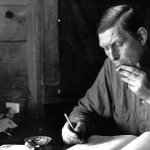“It seems to me,” said Booker T.,
“It shows a mighty lot of cheek
To study chemistry and Greek
When Mister Charlie needs a hand
To hoe the cotton on his land,
And when Miss Ann looks for a cook,
Why stick your nose inside a book?”
“I don’t agree,” said W.E.B.,
“If I should have the drive to seek
Knowledge of chemistry or Greek,
I’ll do it. Charles and Miss can look
Another place for hand or cook.
Some men rejoice in skill of hand,
And some in cultivating land,
But there are others who maintain
The right to cultivate the brain.”
“It seems to me,” said Booker T.,
“That all you folks have missed the boat
Who shout about the right to vote,
And spend vain days and sleepless nights
In uproar over civil rights.
Just keep your mouths shut, do not grouse,
“I don’t agree,” said W.E.B.,
“For what can property avail
If dignity and justice fail.
Unless you help to make the laws,
They’ll steal your house with trumped-up clause.
A rope’s as tight, a fire as hot,
No matter how much cash you’ve got.
Speak soft, and try your little plan,
But as for me, I’ll be a man.”
“It seems to me,” said Booker T.—
“I don’t agree,”
Said W.E.B.



















Comment form: